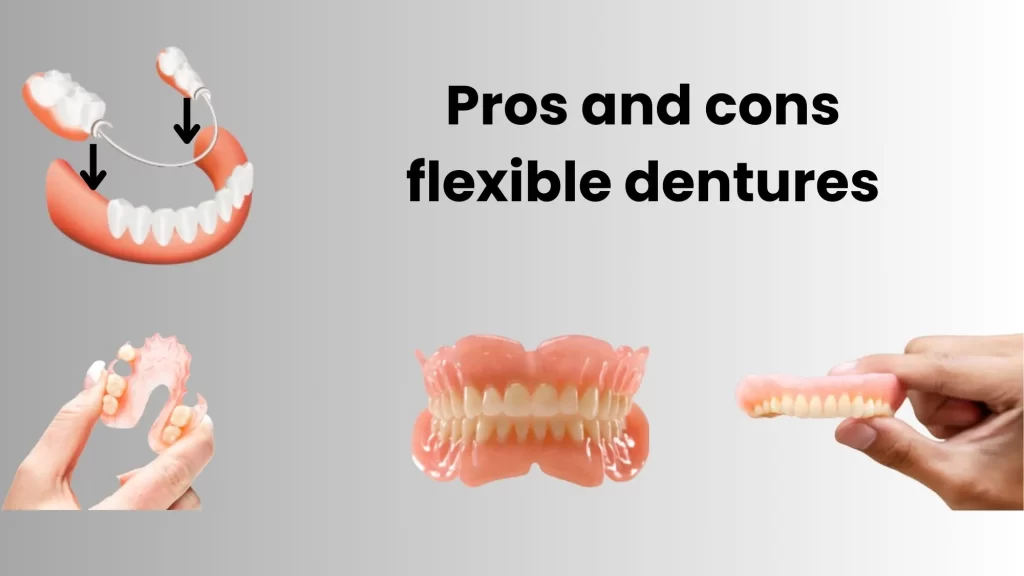Pros and Cons of Flexible Dentures
As the number of adults with partial edentulism increases, the population’s average age and life expectancy increase, and dental hygiene improves; the need for partial dentures increases. Flexible dentures offer an alternative treatment option to traditional dentures in some cases. They are especially preferred in patients with allergies, limited mouth opening, and high aesthetic expectations. Are there any flexible dentures disadvantages? We have examined this topic in depth and prepared “Pros and cons of flexible dentures” that may be useful for you, considering what information you may need for flexible dentures.

Pros and cons of flexible dentures
Flexible dentures advantages
- Suitable for patients with metal and monomer allergies.
- It is easy to use in patients with limited mouth openings. (such as scleroderma).
- It is aesthetic, especially for patients who want to hide the metal colours on the front gums.
- They are more resistant to breakage thanks to their high flexibility.
- They can be thinner and lighter.
- They have the ability to use undercuts (recesses).
- They can be easily adjusted.

Flexible dentures disadvantages
7 disadvantages of flexible dentures:
1. Damages the gums:
Flexible dentures can damage the gums in the following situations:
If the flexible denture does not fit the mouth structure properly, it causes pressure, irritation, or sores on the gums. If the denture is loose, it moves and cause friction. Neglecting to clean the flexible denture leads to gum infections or inflammation. Food debris and bacteria that accumulate under the dentures trigger gum disease. Incorrect fitting or removal of the denture causes trauma. to the gums. Excessive pressure exerted by the denture when chewing very hard foods damage the gums. Flexible dentures made of poor-quality materials harden over time and cause discomfort in the gums. Hygiene is difficult due to its proximity to gingiva tissue.
Additionally, flexible dentures put pressure on the gums during biting. However, the gums are not designed for this and are soft. Therefore, it grazes and damages the gums.
2. Damage to existing teeth:
Flexible dentures cause displacement of abutment teeth and alveolar bone resorption (bone resorption) when used inappropriately. In patients with poor oral hygiene, flexible prostheses lead to the development or exacerbation of caries and periodontal disease. In patients with periodontal problems, teeth may be mobile due to bone loss. This causes the dentures to flex and the negative forces can lead to further bone loss.
3. Hard to change (when damaged):
The surfaces of flexible prostheses are be easily scratched. and damaged. If the denture base is made too thin, there is a risk of breakage. Acrylic teeth easily detach from the flexible denture base due to mechanical adhesion. Flexible dentures are difficult to repair or line. It is not possible to add to the prosthesis; in these cases, rebasing is required. The material is technically difficult to fuse and reshape properly. Adding parts to a damaged area or filling cracks negatively affect the integrity and durability of the denture. The added fragments may not conform to the flexibility of the material, and in many cases the prosthesis may need to be completely replaced.

4. Durability compared to implants and dentures:
Traditional acrylic dentures are also reported to be more prone to breakage and discoloration. Flexible dentures are more durable than acrylic dentures but tend to be less durable than metal dentures.
Compared to implants and other types of dentures, implants are generally longer-lasting and more durable, but their cost is higher. All on 4 and all on 6 treatments are much more affordable in Turkey than in the UK. Although flexible dentures may seem more affordable at first glance, it is actually more economical to get dental implant in Turkey when you think about the long term. Because implant treatments are be used for more than 20 years. Not only that, you can eat, speak comfortably and clean easily like your natural teeth. Book an appointment for implant treatment in Turkey today and get your treatment done easily without waiting in a queue.
5. Cleaning:
Cleaning of flexible dentures are be difficult in some aspects. Hygiene may be difficult to maintain due to its close proximity to the gingival tissue. Without regular cleaning, plaque and bacterial accumulation may occur. Alcohol, abrasive cleaners, or bleaches should not be used for cleaning flexible dentures.
6. Discolouration:
Discolouration of flexible dentures is one of the most common problems. Over time, they become discoloured and easily stained.
7. Flexible Dentures costs:
The cost of flexible dentures varies depending on factors such as the quality of the material used, the type of dentures, the treatment process, and the expertise of the dentist. Compared to traditional acrylic dentures, flexible dentures are generally more expensive.
F.A.Q.
Are flexible dentures right for you?
Flexible dentures offer a comfortable and aesthetic solution. for people with tooth loss. However, they may not be the ideal option for everyone. To determine whether flexible dentures are right for you, you should discuss the advantages, disadvantages, and suitability for your needs with your dentist.